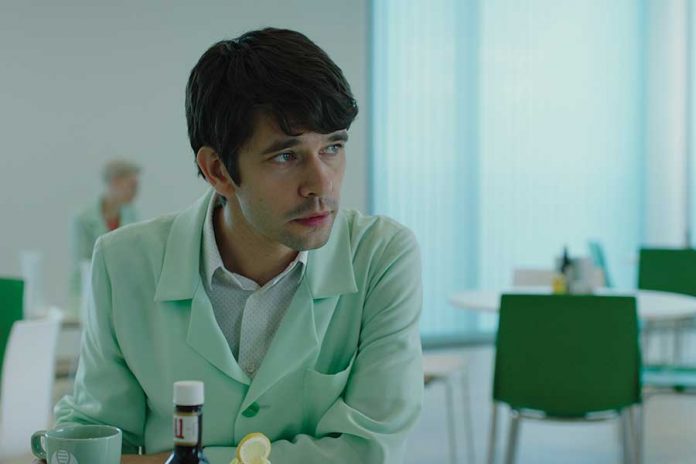Out gay actor Ben Whishaw co-stars in the canny sci-fi drama “Little Joe,” opening Dec. 6 at the Landmark Ritz at the Bourse. Set in the biotechnology world, the film follows Alice (Emily Beecham) and her colleague Chris (Whishaw), who have genetically engineered a special breed of plant. Nicknamed “Little Joe,” the plant promotes happiness if it receives love. Alice and Chris are optimistic that their project will make people’s lives better.
While Alice enjoys her work, her life outside the lab is messy. She lives with her teenage son, Joe (Kit Connor), and often neglects him because of her job. She thinks Joe should spend more time with his father, Ivan (Sebastian Hülk). Joe thinks Alice should date Chris. The mother-son relationship changes after Alice violates her lab’s regulations and brings home one of her plants.
It quickly becomes apparent that there is a complication with Little Joe. Although the plant is sterile — which other members of the lab indicate is unnatural — it gives off a pollen to survive. That pollen “changes” those who are exposed to it, turning them into what they are not. The first victim is Alice’s colleague Bella’s (Kerry Fox) dog, an emotional support animal, who now barks at and bites its owner. Chris is also exposed to the pollen, but he does not admit this to anyone. When he and Alice go out for a drink, he impetuously kisses her. Did exposure to the plant impact his behavior?
How the characters interact with each other and the plant forms much of the drama of “Little Joe.” The film becomes interesting as Bella insists that the plant is nefarious, influencing the feelings, behavior and personality of anyone infected by its pollen. (Insert epidemiology or “Stepford Wives” metaphors here.) Moreover, those who are exposed become defensive of Little Joe, insisting on the plant’s survival at any cost. Is this a side effect of exposure? Is Bella’s assumption correct? Is Alice buying into all of this? These questions are at the heart of this intriguing film.
“Little Joe” is directed and co-written by Jessica Hausner, who exerts deliberate control over the film’s coolly sinister atmosphere. She keeps things aloof to keep Alice — and viewers — off-balance. The visuals are sterile and artfully composed. The soundtrack consists of frequent and discordant beating drums and flutes. There are barking dogs to promote an ominous tone. It all may be too much and could read as telling viewers how to feel.
The film is best when it is ambiguous. Have Chris, Joe and Bella all “changed,” or is Alice imagining it? She experiences fear, guilt and other emotions that are quite the opposite of the happiness Little Joe provides. The underlying theme here is to “be your authentic self” or not to “deny who you are.” (Hausner indicates this, repeatedly, in expository dialogue.) But at the crux of that idea is the thorny moral issue of risking infection. Viewers can chew over this while siding with Alice or thinking she is overreacting, acting inappropriately or being selfish.
Sometimes a little too much happens on screen, allowing viewers’ minds to wander. “Little Joe” stretches its drama thin as it slowly builds to its denouement. A scene where Alice goes to pick Joe up from school, and he ignores her — only to later claim he didn’t see her — lacks impact. Small moments like this one should build on the film’s idea of truth and trust, but they do not generate any profound feeling. Better are scenes depicting Alice growing frustrated by Joe’s budding independence. He keeps secrets from her, sneaks into her lab and gets a girlfriend, Selma (Jessie Mae Alonzo), but is he just behaving more like a typical teenager?
Alice also becomes wary of Bella and her negative pronouncements, until she begins to believe them, much to Chris’ chagrin. And Alice becomes more aware of Chris’ prejudices and odd behavior, as when he meets with Joe behind her back.
“Little Joe” works if viewers accept Alice’s paranoia. And to that end, Emily Beecham is impressive as Alice, modulating her reactions and emotions carefully. She won Best Actress at this year’s Cannes Film Festival for the role. Beecham resists expressing much of anything, but her internal performance conveys anxiety, disappointment and conflict very well.
As Chris, Ben Whishaw provides fine support, especially in his passionate declaration of love to Alice. Also excellent are Kerry Fox, who makes Bella a brusque, enigmatic woman, and Kit Connor in the pivotal role of the teenage Joe.
“Little Joe” is all about perception and manipulation. While some viewers may feel underwhelmed, those who engage with this cunning film will appreciate its lofty ambitions.

